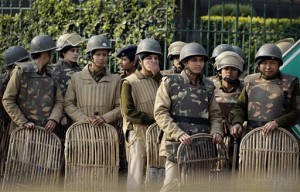
Indian policewomen in riot gear stand guard at a check point after security was beefed up following the death of a young woman who was recently gang-raped in a moving bus, in New Delhi, India, Saturday, Dec. 29, 2012. The death triggered appeals for calm from Indian leaders who feared a fresh outburst of violent street protests. AP PHOTO/ALTAF QADRI
NEW DELHI, India—A medical student who was savagely gang-raped in New Delhi died in a Singapore hospital Saturday, triggering appeals for calm from Indian leaders who feared a fresh outburst of violent street protests.
Police threw a ring of steel around the center of the Indian capital after news of the 23-year-old’s death was broken in the early hours of the morning by the Singapore hospital that had been treating her for the last two days.
Prime Minister Manmohan Singh led the tributes to the unnamed woman who has been dubbed “India’s Daughter” as he insisted that he understood the wave of protests that erupted in the aftermath of her assault on Dec. 16.
Her body is to be flown back to India later in the day, accompanied by her parents who were at her bedside when she was pronounced dead at 4:45 a.m. (2045 GMT).
“She had suffered from severe organ failure following serious injuries to her body and brain,” Kelvin Loh, the chief executive of Singapore’s Mount Elizabeth Hospital, said in a statement.
“She was courageous in fighting for her life for so long against the odds but the trauma to her body was too severe for her to overcome.”
After boarding a bus on December 16, the student was attacked by six men who took it in turns to rape her and assaulted her with an iron bar before throwing her and her male companion off the moving vehicle.
Gang rapes are a daily occurrence in India and many go unreported by their victims who have little faith in an often painfully slow justice system and are deterred by the response they can receive from male police officers.
But the particularly savage nature of the bus attack in Delhi brought simmering anger to the boiling point and prompted the government to promise better security for women and harsher sentences for sex crimes.
“We have already seen the emotions and energies this incident has generated,” Singh said in a statement.
“These are perfectly understandable reactions from a young India and an India that genuinely desires change.”
The police have been heavily criticized for their hard-line tactics in trying to quash the protests, including the frequent use of teargas and water cannon.
Neeraj Kumar, Delhi’s police commissioner, urged people to maintain calm across the city as his office announced that the area around the India Gate monument – the epicenter of the protests – would be sealed off.
Ten downtown metro stations were also closed to the public while large numbers of roadblocks were set up on roads leading to government buildings.
Many of the security reinforcements who had been drafted in were women, following a pledge by the government to have a rethink about policing.
New Delhi Chief Minister Sheila Dikshit also appealed for calm and pledged “solid steps will be taken very soon” to protect women in India’s capital.
The government has had to fend off claims that the victim was transferred to prevent her from dying on Indian soil and thus further inflaming tensions here.
However, T.C.A. Raghavan, the Indian high commissioner in Singapore, said the decision was taken on medical grounds after “consultations between the medical team treating her in Delhi with the surgeons and physicians in Singapore.”
The envoy also spoke in a press conference of the ordeal endured by the family of the victim, who hail from a rural part of Uttar Pradesh.
“They have borne this loss with a great deal of courage and fortitude and understanding,” Raghavan said.
“They have repeatedly asked me to say how inspired they are by the many messages of support and condolences they have received. And also this reinforces their view that the death of their child will lead to a better future for all women in India and in Delhi.”
Indian television news channels carried blanket coverage of the news, with the NDTV network running a ticker-tape headline “RIP India’s Daughter.”
Her ordeal began after she boarded a school bus that a group of six young men were taking for a joyride after drinking heavily, according to police and prosecutors.
She had been out at the cinema with a male companion who was also attacked by the gang. The bus, which had tinted windows, was able to pass several police checkpoints before the pair were eventually thrown out of the vehicle.
News of her death in Singapore spread rapidly back home via social media.
“She experienced hell on earth and we should demand justice for her,” said Rawatmal Dhulia, a trader on an overnight train from Rajasthan to Delhi who broke the news to his fellow passengers.
Six men who had already been arrested over the assault are now expected to be charged with murder, a crime which can carry the death penalty.